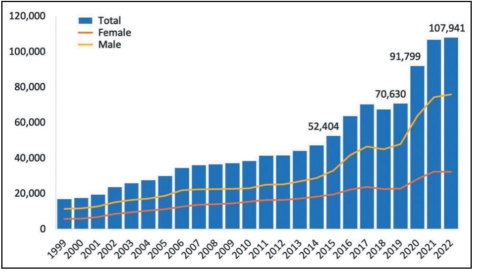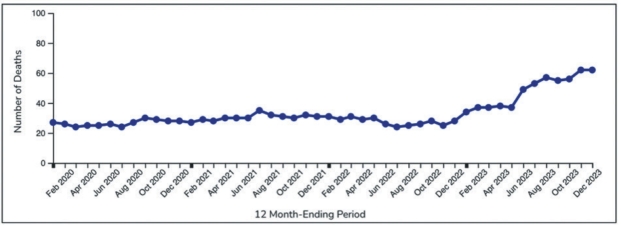
The increased incidence of drug overdose deaths has garnered the attention of the American public due in large part to media coverage surrounding the opioid epidemic, which has reached record levels in recent years. In many municipalities across the nation, the number of deaths from drug overdose continues to climb (see Figure 1). The ArkLaTex region is not immune to these trends, and the effects of this epidemic can be felt throughout the communities in our area. Caddo Parish, which includes Shreveport, has experienced a marked increase in overdose deaths since late 2022 (see Figure 2).
Interestingly, the rate held steady through the COVID-19 pandemic but rose recently. Understanding this trend can be difficult, as many factors underpin these data.
A historic deal
was reached in 2021 when attorneys general from around the country
negotiated the terms of the $26 billion opioid settlement. Several
pharmaceutical companies and distributors became responsible for paying
out this substantial sum to local governments
nationwide. These funds are designated to ensure they will provide for
programs directly related to combatting the opioid crisis. This presents
a unique opportunity for governments, public health officials, academic
research centers and health care institutions to come together to
create programs and services that will have a tangible impact on the
addiction treatment landscape.
LSU
Health Shreveport is poised to impact our region in the coming years
significantly. The creation of the Louisiana Addiction Research Center
(LARC) was a catalyst for addiction research at the university. Through
LARC’s pipeline of groundbreaking research, the medical center aims to
support a continuum of care that can provide valuable resources to the
community. Key collaborations with local health care entities, including
drug and alcohol
rehabilitation facilities, will support practical and effective
addiction treatments. At the same time, efforts are made to further
translational projects that seek to apply research findings in the
clinical arena.

Figure 1: National Drug Overdose Deaths, 1999-2022 Source: National Institute on Drug Abuse (nida.nih.gov)

Figure 2: Month-ending
Provisional Counts of Drug Overdose Deaths for Caddo Parish, Louisiana
Source: U.S. Centers for Disease Control and Prevention (cdc.gov)
From
the theoretical to the practical, efforts underway to help tackle the
ongoing substance use issues plaguing our community are bound to have a
genuine impact on
individuals suffering from addictive disorders and those who care about
them. As these programs develop, the goal would be to focus on education
about new offerings to ensure that most individuals who need this help
can readily access care. Although not limited to addressing
substance use disorders, a Crisis Response Coalition was formed in
recent years to address the mental health needs of the community.
Dedicated individuals from various agencies meet regularly to coordinate
providing care to our citizens in urgent need. Focusing on individuals
in crisis will help provide a safety net for the most acute cases while
efforts to enhance more routine substance abuse treatment are being
cultivated.
I
like to take any chance I have to educate others on the availability of
the 988 Suicide & Crisis Lifeline. By simply dialing “988,” the
caller can be connected to a crisis center 24 hours a day. The ability
to dial using three digits was rolled out nationwide in 2022, and the
simplicity of this process has helped expand care in crisis situations.
Shawn
McNeil, MD, FAPA, FASAM, is a clinical assistant professor, director of
the Psychiatry and Behavioral Medicine Residency Program and director of
clinical research for the Louisiana Addiction Research Center at LSU
Health Shreveport. He is also the associate CMO at Louisiana Behavioral
Health.